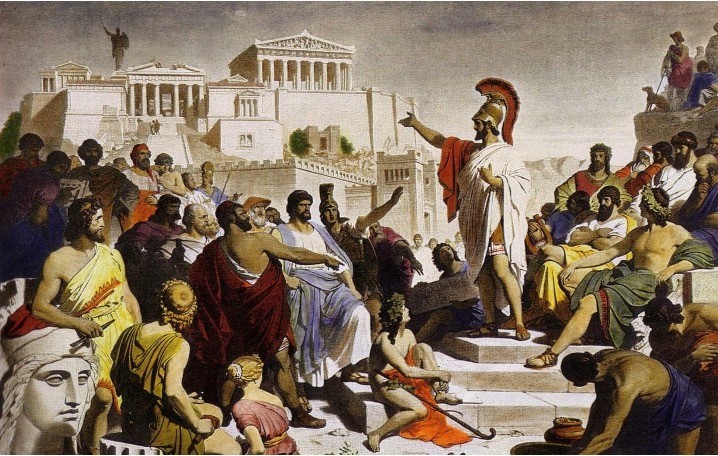DEMOCRACY

Democracy is defined as a system of community management where political and governmental decisions are made in accordance with the will of the population, or at least the majority of it.
Implementing this type of democracy is easy in a small community when the entire population, gathered in the town square, must decide by a show of hands who should take the sheep to pasture, choosing between shepherd A and shepherd B.
The problem becomes more complex when the community decides to abandon caves and everyone must have a hut as a dwelling. First, a group of experts must be identified to define the type of hut, location, materials, and implementation plan, and then ensure the project’s realization. An authoritative figure must also be identified to coordinate and control operations, resolving any inevitable issues of priority and organization.
This process initiates a type of democracy in the modern sense, which essentially comprises three components:
- The population, which theoretically should express its opinion on all matters concerning community management;
- A group of experts or volunteers working to achieve community goals;
- An authority to coordinate and govern community projects.
However, this is where problems begin to arise.
Population Participation
Who should participate in decision-making?
It’s easy to say that everyone should participate, but should infants and young children vote? The issue is resolved with a first offense to the concept of democracy, as voting is denied to those who haven’t reached adulthood (another arbitrary concept) even when the issue specifically concerns them, such as the distribution of milk and grain. Nonetheless, parents or heads of families decide, preferably those with more credit (better if monetary).
Considering that livestock must be tended during assemblies and many women must stay home to care for infants and the sick, the idea of having only heads of families vote might be the best, leaving family-level democratic decisions on what the head should support in the general assembly. This assumes democracy has also entered the family, but the collegiality and universality of the vote continue to erode.
Occasional or permanent foreigners may not have the right to express political opinions in a country that is not theirs and whose identity they do not fully share.
Can everyone decide on everything?
Certainly not, as very few have adequate knowledge about hut construction techniques or discount rates. Having an undifferentiated mass decide, via referendum, whether to maintain or abolish a Ministry of Agriculture triggers a decision-making mechanism that can hardly account for the problem’s subtleties.
The community should therefore delegate to a small group of competent people the task of making “democratic” decisions. This creates a second significant wound to the idea of democracy, as decision-making power is delegated to others.
Are the population’s choices always “democratic”?
Often not, because every population comprises “minorities” such as youth, the disabled, the elderly, students, the sick, the wealthy, graduates, etc. Public decision-making mechanisms are usually determined by implicit or explicit alliances of some minorities, forming majorities to enforce their positions, without guaranteeing the protection of others who become minorities. Thus, groups, parties, unions, brotherhoods, cartels, or alliances must form to embody majorities or protect minorities, opening the door to manipulation.
The democratic assembly system drifts away, perhaps due to someone’s will but also due to the intrinsic logic of communities wanting to govern themselves.
Experts or Aristocrats:
How to identify experts?
The term “experts” is ambiguous, and historically the term “aristocrats” was used, originally meaning those with “better abilities.” They can be generally chosen by the population as its representatives, but they usually emerge due to evident competence and willingness to work for the common interest.
This creates a tendency for these “experts” to consolidate their position, a tendency often confirmed by the population that sees them as capable interpreters of general needs. They then deserve to remain in a more or less defined social class or caste, with the mission of mediating between popular will and its implementation.
This creates another alteration of the democracy concept, as many technical-political public life choices are delegated to a separate population segment.
Can expert aristocrats decide on everything?
Evidently not. The various dynamics of real political systems in democratic nations tend to guide the population towards choosing capable individuals, while collective problems vary widely, from sheep to satellite systems, making it clear that expertise in every public decision sector is practically impossible.
Thus, this mediator class opens to even more expert individuals who instruct, guide, and direct those representing the population, often based on assessments unrelated to the community’s will.
The democratic assembly system seems a distant memory, but fortunately, a superior body oversees everything: the president, governor, monarch, coordinator, Big Brother, or similar.
Coordinator or Leader:
How does the coordination authority emerge from the community?
In primitive and small communities, the leader typically emerges for their strength and wisdom, demonstrated through valid historical choices and a certain energy in supporting them.
In larger communities, where the population perceives appearance more than substance, there is a risk of choosing a leader who best rides or sings, embodying unconscious aspirations, dreams, or ideals, without truly appreciating whether the person has the qualities required to govern.
Can the coordination authority be competent in everything?
Certainly not. The coordination authority requires transversal skills, leaving concrete achievements to experts (aristocrats) while refining interdisciplinary control systems and resolving inevitable conflicts in project realization.
Thus, the leader or coordinator emerges through a different mechanism: either belonging to a caste, dynasty, or party that has historically produced suitable individuals, or through an elective process that, while appearing to be based on popular will, is controlled and determined by opinion groups (parties) or power groups (lobbies) with adequate convincing power, explicit or hidden.
In either case, the direct democratic decision-making of village squares is lost in the many alleys of what we call politics, not democracy.